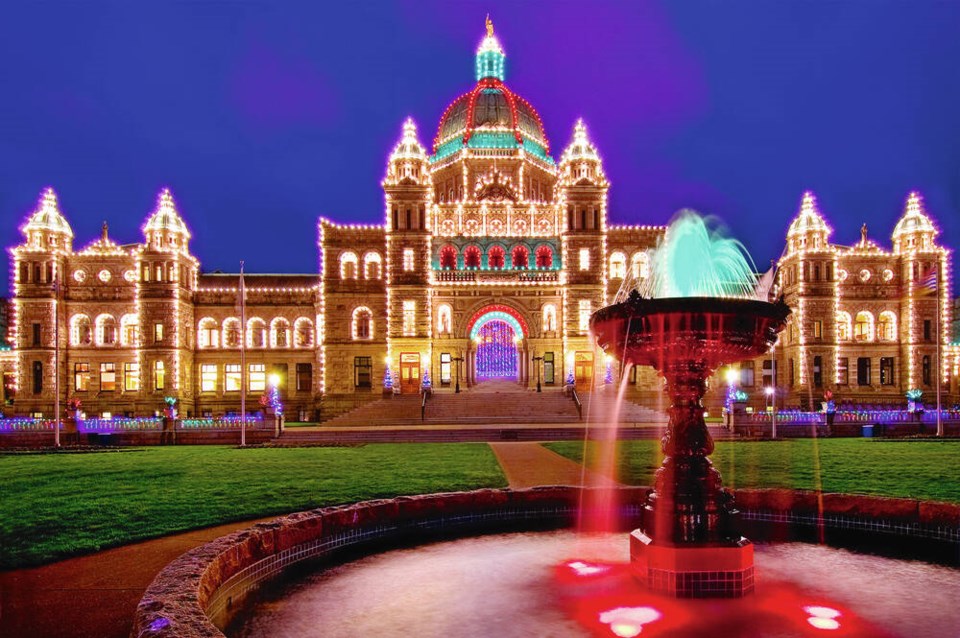A century ago, the Christmas season arrived as our community — like most of the world, for that matter — was still reeling from the devastating impact of the Great War.
People in 1921 Victoria still found a way to celebrate the season, and to help each other.
Today, as the humbling disruption caused by the global pandemic continues, we celebrate again, even as we see the fragility of everything that we had taken for granted.
Just like our ancestors did a century ago.
William Lyon Mackenzie King became prime minister that week, and B.C.’s drivers were getting ready to start driving on the right side on New Year’s Day — but Christmas seemed to be on everyone’s minds, despite the hard times.
In its Christmas editorial, the Victoria Daily Times noted that “the clouds of general economic reaction, and in some places, of revolt, bloodshed, starvation and incalculable misery” were still being felt around the globe.
Locally, there was a spirit of giving. Local hospitals held special dinners and concerts for their patients.
A dinner for unemployed men, sponsored by trade unions, was held at the Trades Hall, 1318 Broad St., on Christmas Day. The menu included chicken soup, fish, turkey, vegetables, English plum pudding cake, mince pie, Christmas cake, crackers, nuts and raisins, as well as cigars and cigarettes.
About 140 men attended the dinner. All food left over was distributed to the men.
That season, the Rotary Club raised $9,531 to help provide food and clothing to the poor. The fund was promoted by both the Victoria Daily Times and the Daily Colonist.
“Last minute demands upon the fund have been so numerous that more money is urgently needed in order to make sure that every need is supplied,” the Colonist reported.
The item most in demand? Boots.
Local stores reported that although prices had dropped from the previous year, money was still tight.
David Spencer, who ran the department store that bore his name, said that people were only interested in the most practical and useful articles.
Jeweller J.W. Duncan agreed that sales were generally down that year, but more people were buying presents for others.
Joseph Wilson of the Wilson Brothers men’s wear store said demand was high for small items such as gloves, ties and socks.
Angus Campbell said that in his women’s wear store, gloves had been the most popular item purchased.
G.D. Christie said many people were buying for the entire family in his shoe store. “One thing I noted was, the ladies were selecting goods of the most substantial and long-wearing character.”
J.H. Fletcher of Fletcher Brothers said he had seen a strong run upon gramophone records and the lower-priced talking machines. Sheet music was also popular.
One store was busier than most — perhaps not surprising, given that Prohibition had ended barely six months earlier. The government liquor store at 709 Johnson St. saw steady lineups in the days leading up to Christmas.
“It will not be anything of a ‘dry’ Christmas for many Victorians,” the Colonist reported on Dec. 25, 1921. “Never in the history of the local store has there been such a persistent and continued demand for wet goods as was experienced yesterday.”
There was a long lineup when the store was scheduled to close at 7 p.m. on Christmas Eve, but everyone crowded into the store and the staff stayed to help them. It was an hour before the last person left, intoxicants in hand.
“Whisky of all brands, wines, liqueurs, beers, gin and rum, together with other brands of drinkables in stock, disappeared from the shelves as if by magic,” the Colonist said.
The Christmas editorial in the Times, which started with a summary of the year’s bad news, ended with a strong sense of hope.
“Although the sky may be dark and threatening, there are many signs to indicate that it is darkness which precedes the dawn,” it said.
“We shall find the strongest and wealthiest nations joining hands in helping the weakest, in the realization that the world is now so small that there can be no permanent prosperity for any part of it if any other considerable area is demoralized.”
The same sentiment applies within our community as well. The strong and wealthy should do all they can to help the weak and the needy.
That belief was behind the Christmas spirit in 1921, as it was in the centuries before and the decades since. It remains vital to this season.
With the pandemic, let’s hope the darkest hours have passed, and that we are soon to see the dawn. After all, Christmas, the season of giving, is also the time for hope.
Merry Christmas, everyone.



